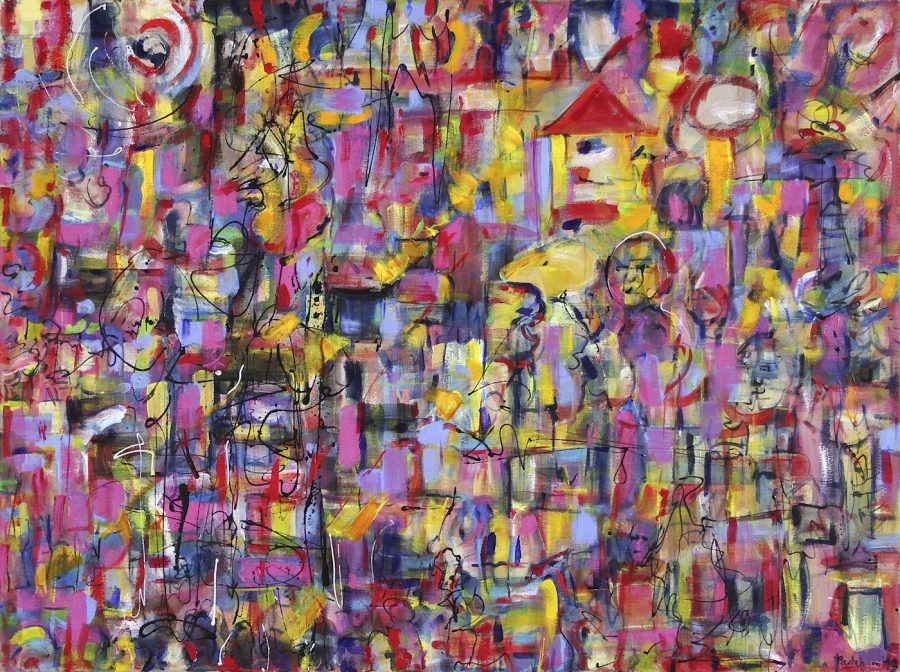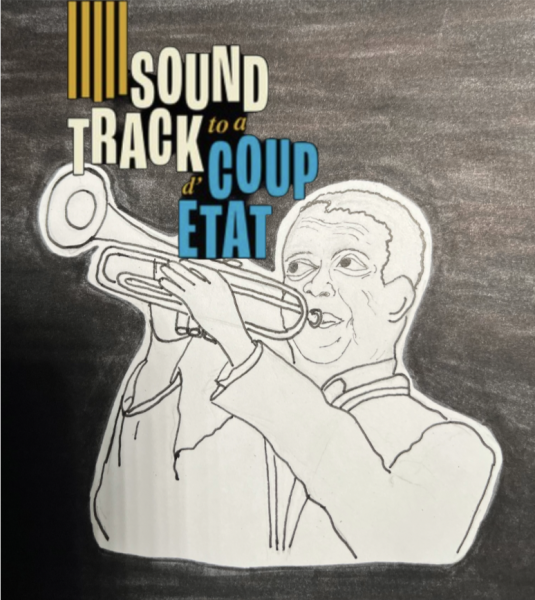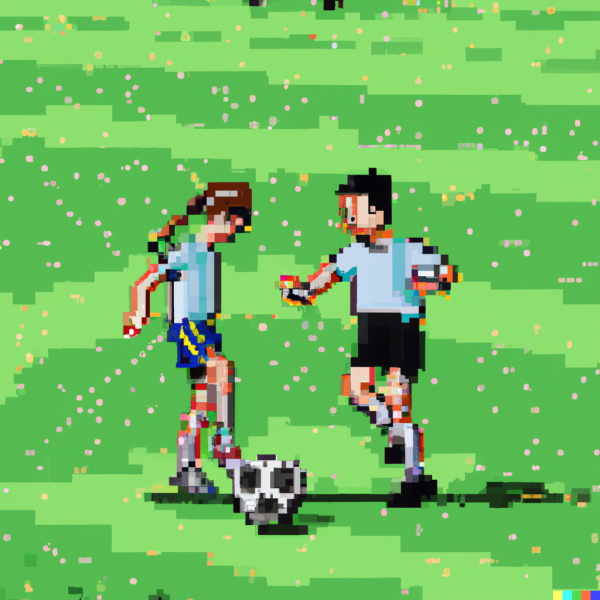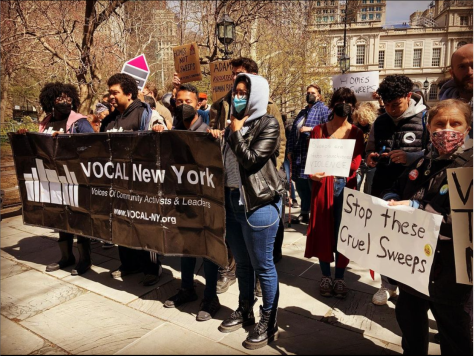Lines of Flight: The Anthropocene and Posthumanism
“Lines of flight” is a term coined by the philosophers Gilles Deleuze and Félix Guattari to trace the pathways of desire and to describe the totality of ideas that can spring out of the unconscious: pure multiplicity, infinitesimal interactions. This column is to be an assemblage of all these lines of flight. For our purposes, lines of flight are a fluid, sporadic, and unrestrictive concept: one that permits us to write uncorrelated stories under this one column. Of course, there might be a trend between some articles but it is nothing necessarily intentional and is by no means meant to be prescriptive. The only rule of this column is that there are no rules. Write what you please, how you please!
What follows are the possibly incoherent, likely illogical, psychological ramblings of a 17-year-old who follows their lines of flight and begs you to not too heavily criticize his discontent with the state of the world today, informed by possibly misinterpreted readings of Nietzche, Deleuze, humanism, posthumanism, and history in general—and maybe some more things.
I write this on the cluttered corner of my desk— the one that is least occupied by half-read books, manuscripts, annotated music scores, and posters. The room is warm and humid with a smell of stale paper—I do not turn on the air conditioning because I feel guilty wasting energy and contributing to global decay (for the same reason, the room is dim). I ruminate on my emotions. All of them boil down to one primordial question: that of the Anthropocene—an epoch characterized by the domination of some humans (Anthropos) on all spheres of being. The obvious symptom of this era is the end of the world as we know it: climate change. Although, in retrospect, it seems not to be a symptom so much as it constitutes the very essence of the Anthropocene. Will we all die? We’ll see. I’m not so inclined on answering these existential questions on the risk that they might seem too cliché. One thing is for certain—at least for me. If we do not die of dehydration, famine, war, drowning, or any other climate-induced disaster, we risk falling into the Misanthropocene: an era governed by a collective species-hate, a lack of any emotion other than the (for the most part unfounded) hate of our (well… not really ours, more of some very specific peoples’) actions of the past. Another certainty is that we cannot get rid of the Anthropocene by holding our same individualist conceptions of what constitutes human and what constitutes non-human.
“The Anthropocene is the age of flatulence.” More than this, it is flatulence, it is the fecal remnants of past ancestors. Houses built on the soil of feces are more than common. Is the soil under Capitol Hill not also full of feces (made from dead humans, detritivores, and animals)? The pillars of our world are the pillars of the digestive system. My flatulence, your flatulence, the cow’s flatulence, the car’s flatulence, the chimney’s flatulence, our flatulence. That excrement of pure disgust and filth is the product of ever-more human-modified organisms.
The Anthropocene is the gastrointestinal tract of society destined to rupture.
But the Anthropocene, like its fecal mother, is ready to be decomposed, and its ruins are ready to be the fertilizer for the construction of a non-anthropocentric world. Apologies for the tangent, it is better to go posthuman.
“Everything the philosopher has declared about man is, however, at bottom no more than a testimony as to the man of a very limited period of time.”
(Nietzche, Human All Too Human)
Indeed, what compels us to make the distinction between human and animal, between the civilized and the savage? One might, and not in bad faith, point to all the so-called accomplishments of human civilizations. But let us look at the accomplishments that we would call our residences and our landscapes. In “developed” spaces (which have themselves been developed solely out of the exploitation of other spaces), beauty is pervasive and crosses borders. Housing, when applied efficiently, is useful and pleasant. There is no denying this. But is it not also true that bees find their homes not in any ornamented structures, but rather in the hexagonal cells that compose their honeycombs?—its beauty resides in its pure simplicity. Purely utilitarian geography perfectly houses the bee. Ants, like bees, find their homes, not in ornate buildings, but in rhizomatic tunnels—it is this assemblage that creates its beauty. Is it also not true that in most parts of the world housing is not guaranteed, that millions suffer for lack of adequate housing? Beautiful buildings neighbor flimsy shacks. Can we not then make the argument that those insects that we deem inferior, the ants and the bees, are actually better at providing for themselves than we are? Every beautiful mansion built contains as a byproduct the plague of homelessness and poverty. Perhaps we are inferior.
Since its colonial endeavors conducted by European countries, colonial society has long conceived of itself the oasis of rational morality in a seemingly violent biosphere; as divine soldiers against the impure and residual other. Colonial institutions have been the bastion of an enlightenment humanism that prioritizes the Anthropocene over all non-humans and justifies the unjustifiable. In an age of ecocide, political nihilism, and pervasive fascism, it is, now more than ever, our responsibility to engage in emancipatory actions, liberation movements, and to reconceptualize the very notion of what it means to be human— more specifically, how humans should act.
We can easily be tempted to look at the category of the savage as one without any history, as one that simply is, as it exists by not being human. However, we would be mistaken in saying that what is not considered human has remained constant over time. No! The categorization of beings as “human” has always changed, and will always continue to change. It is contingent upon the power structures of relative societies. For example, the humanist movement of the Enlightenment did not consider anybody that displayed variance from the white patriarchal cisgender to fulfil roles of personhood, or if they did, they didn’t treat them as such. Needless to say, cultures that held different gender systems, beliefs, or were composed of non-white people were not taken into account when Petrarch and the later Enlightenment philosophers first conceptualized what it meant to be human.
There is no correct scientific or metaphysical justification to assume that man has become distinct from nature (remember? the Anthropocene is built on natural biological matter). We make no distinction between the production process and the produced until that which is produced has become essentially different. The posthuman, as a subject, is the Übermensch: the superhuman, though a better term might be superbeing. The one who has overcome the painful embarrassment and laughing stock that is the human. The Übermensch has overcome any attachment it has to the Earth. Many non-humans are already super beings.
We must make no distinction between man and nature. We must deal with the Homo sapiens as the Homo natura—an inseparable part of nature. We rely on nature in the same way a newborn relies on its mother’s milk, in the same way a bee relies on its hive. By this logic, if Mother Nature, out of a continuous process, has given birth to man, is it not also logical to say that her essence lies in us humans as well? In that case, we really can’t distinguish ourselves from any other machine! Our (by which I intend all sentient and non-sentient existences) metaphysics is that of machines plugged into other machines: the breast machine plugged into the mouth machine, the vein machine plugged into the heart machine, the skin machine onto the muscle machine, the plant machine plugged into the soil machine.
“Not man as the king of creation, but rather as the being who is in intimate contact with the profound life of all forms or all types of beings, who is responsible for even the stars and animal life, and who ceaselessly plugs an organ-machine into an energy-machine.”
(Deleuze and Guattari, Anti-Oedipus).














Carlos Tavares • Oct 11, 2021 at 21:08 The UNISVerse Pick
On the event of Indigenous Peoples Day, and upon some reflection of this article, I would like to state that what is called “posthumanism” by Western philosophy, as a form of combatting climate change and the Anthropocene, is a state of being that is practiced by many indigenous societies all over the world. Although I think that posthumanism, as a western construct, is still interesting and useful, I must recognize the relevance of indigenous practices to it.
If we maintain the dissolution of the human-nature binary to be necessary for combatting climate change, the notion of “land back” becomes ever more important because it is the original peoples of these territories who have the most experience and skill in taking care of the land. Land back refers to returning occupied territories to their rightful owners: the Lenape in ‘New York’, the Taíno in the ‘Caribbean’, the Guarani in large parts of ‘Brazil’.
“Land back” is an ethical obligation regardless of its relation to fighting climate change.